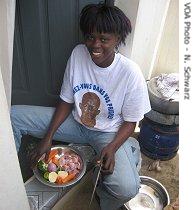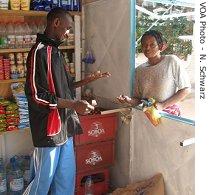2007年VOA标准英语-Senegal Low-Income Workers Open Bank Accounts
时间:2019-02-07 作者:英语课 分类:2007年VOA标准英语(五月)
Dakar
19 May 2007
In the West African nation of Senegal, fewer than 10 per cent of people have accounts at traditional banks. Such accounts have traditionally been seen as only for the very rich. But a growing network of branches extending into more remote areas means that more people than before have access to banks. Naomi Schwarz visited on the outskirts 1 of Dakar with a new mother who has a savings 2 account.

Margot Seck
In a one-room apartment on the outskirts of Senegal's capital, Dakar, Margot Seck is cooking lunch on her small balcony. She is using her short maternity 3 leave from her job as a cashier to set up the apartment.
Since she is not working now, she has been spending from her savings. But ever since the 25-year-old came to Dakar from her
family's village and began working, she has been putting aside a small portion of her paycheck for just such an occasion. "When I was paid my salary, I would spend what I needed, and I would bring the rest to the corner shopkeeper to hold on to for me," she says.
Two years ago, with the help of her boss, Seck opened an account at one of Senegal's commercial banks.
Seck's boss advanced to her and three co-workers the 150-dollar minimum deposit the bank required, and she helped them acquire the
necessary papers.
Seck goes to a small bedside cabinet and pulls out a simple wooden box with a lock.
She unlocks the box and takes out the papers, explaining that before she moved in with her husband, she shared a room with many single cousins, and the locked box was needed to keep her finances private.
She says she told only her brothers and sisters about the bank account, and just recently, her husband. "Ah, when you say that you have an account, people will think that you have a lot of money, even though it is nothing."
Seck says the bank takes money out of her account for various fees. "The first month, they took out 10 dollars. We were shocked, why did they take out this ten dollars. When we went to the bank, they told us it was for insurance," she says.
Seck says the bank also debits 4 just over two dollars every three months for maintenance costs.

Some Senegalese save money at corner shops like this one
But despite these costs, she says the bank account has helped her save more money than before. "In the house, it is no good, because you can spend the money. At the boutique it was better, but when you have problems, you can go straight to the boutique and take the money. But when it is at the bank, sometimes you are slower to withdraw your savings," she says.
Despite Seck's story, most Senegalese do not have bank accounts.
Oumar Diene, of the Senegalese non-governmental organization CRESP, says this may be changing. "We have the impression that these days, there is an accent on potential clients who, until now, have not been taken into account by the big banks," he says.
He says that banks are directing their marketing 5 campaigns at university students, many of whom have little or no income. He also notes the increasing number of bank branches across the country.
But obstacles are still keeping many Senegalese from opening accounts.
Mohammed Wilson, a director at Senegal's CBAO bank, says one obstacle is a culture that prefers cash transactions. He says Senegalese are wary 6 of entrusting 7 their money to someone else, and they are unfamiliar 8 with how banks work.
But even for those who are interested in bank accounts, the minimum deposit can seem overwhelming, especially for non-salaried workers whose income varies from week to week. Wilson says the minimum deposit is required for the banks to cover their operating costs. He says if more people had bank accounts, the banks would be able to reduce the minimum deposit and also the fees.
Since so many businesses rely on cash transactions, Wilson says his branches must be prepared for large cash withdrawals 9. This would be less of a burden if more people had accounts, and money could change hands invisibly, through checks.
- Our car broke down on the outskirts of the city.我们的汽车在市郊出了故障。
- They mostly live on the outskirts of a town.他们大多住在近郊。
- I can't afford the vacation,for it would eat up my savings.我度不起假,那样会把我的积蓄用光的。
- By this time he had used up all his savings.到这时,他的存款已全部用完。
- Women workers are entitled to maternity leave with full pay.女工产假期间工资照发。
- Trainee nurses have to work for some weeks in maternity.受训的护士必须在产科病房工作数周。
- Does this item go among the credits or the debits? 这笔账应记入贷方还是借方? 来自《现代英汉综合大词典》
- My bank account shows two debits of 5 each. 我的银行帐户借方记入了两笔5英镑的款项。 来自辞典例句
- They are developing marketing network.他们正在发展销售网络。
- He often goes marketing.他经常去市场做生意。
- He is wary of telling secrets to others.他谨防向他人泄露秘密。
- Paula frowned,suddenly wary.宝拉皱了皱眉头,突然警惕起来。
- St. Clare had just been entrusting Tom with some money, and various commissions. 圣?克莱亚刚交给汤姆一笔钱,派他去办几件事情。 来自辞典例句
- The volume of business does not warrant entrusting you with exclusive agency at present. 已完成的营业额还不足以使我方目前委托你方独家代理。 来自外贸英语口语25天快训
- I am unfamiliar with the place and the people here.我在这儿人地生疏。
- The man seemed unfamiliar to me.这人很面生。
- He has made several withdrawals from his bank account. 他从银行账户上提了几次款。 来自《简明英汉词典》
- It is not the bank's policy to deduct interest on withdrawals. 提款需扣除利息这并非是本银行的政策。 来自辞典例句